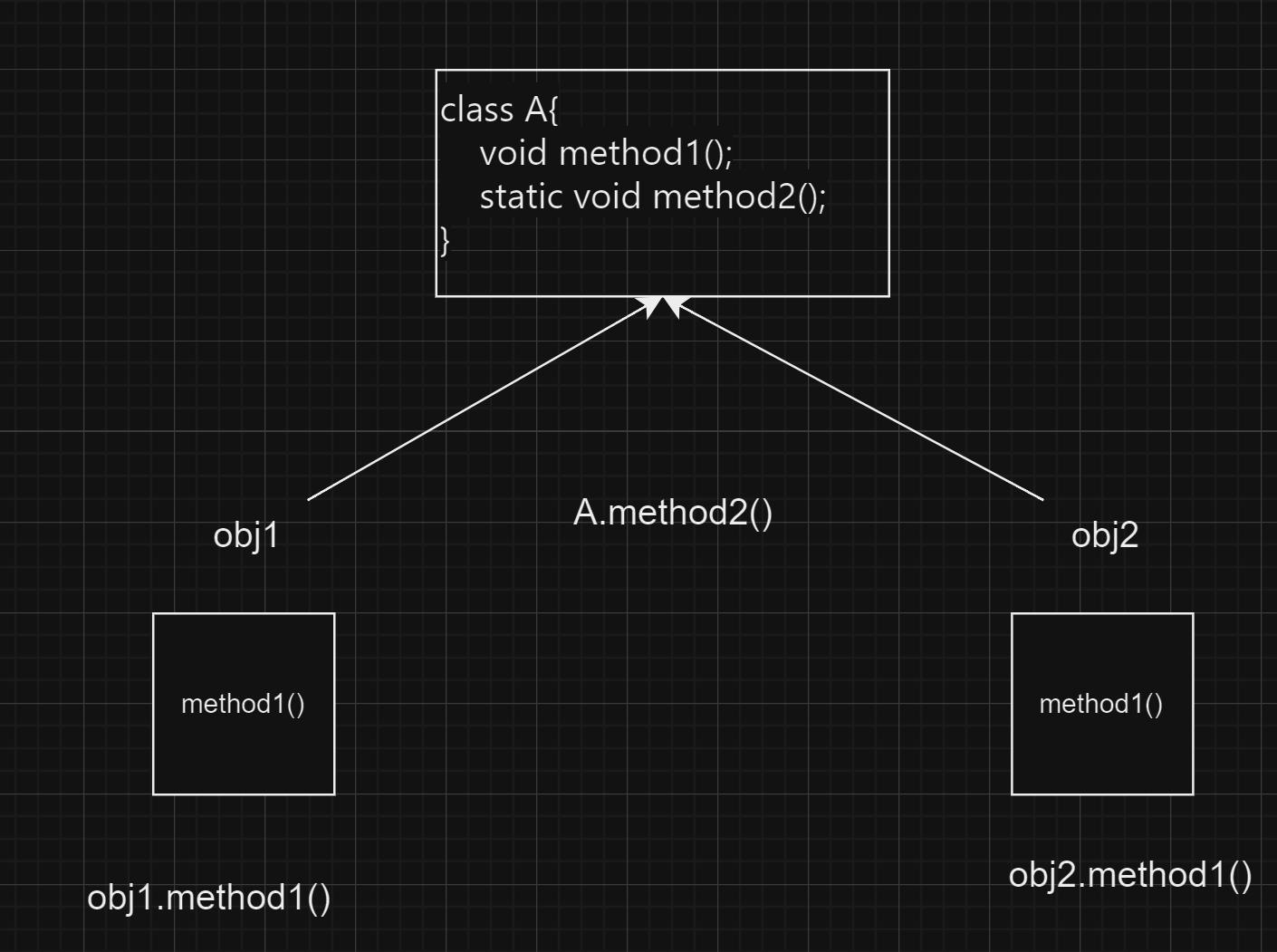What is Method?
Method is used to perform certain task.
It's a collection of instruction that perform some specific task
It can be used to bring the code readability and re-usability.
public class Calculation {
public int sum(int val1, int val2){
int total = val1 + val2;
//doing some logging stuff
System.out.println("addition of val1 and val2 is "+total);
return total;
}
public int getPriceOfPen(){
int capPrice = 2;
int penBodyPrice = 5;
int discountedPrice = sum(capPrice,penBodyPrice-1);
System.out.println(discountedPrice);
int totalPenPrice = sum(capPrice,penBodyPrice);
return totalPenPrice;
}
}
How to declare a method?
public static sum(int a, int b) throws Exception{
//method body
}
/*
public - access specifier
static -
sum - method name
int a, int b - parameters
*/
Access Specifiers
Public: can be access through any class in any package
Private: can be access by methods only in the same class.
Protected: can be access by other classes in same package or other subclasses in different package.
Default: If we do not mention anything, then Default access specifier is used by Java. It can be only accessed by classes in same package. (note subclasses in different package cannot access it)
Note:
Package: It is a collection of similar classes
Subclasses: Children of parent class.
Return Type
Method do not reutrn anything use "void"
Use Class Name or primitive data types as return type of the method.
public int sum(int val1, int val2){
int total = val1 + val2;
return total;
}
public boolean isPresent(int val1){
return true;
}
public void isPresent(int val1){
return;//not requried
}
Method Name
It should be verb (some kind of action) like getData, sendMessage.
Should start with small letter and follow camel case in case of multiple words.
Parameters
It's a list of variables that will be used in the method.
Parameter list can be blank too.
Types of Method
System Defined Method
- Methods which are already defined and ready to use in Java like Math.sqrt()
User Defined Method
- Methods which programmer creates based upon the program necessity.
Overloaded Method (Static binding)
More than one method with same name is created in same class.
Overloaded methods get differentiated based on the arguments. Return type is not considered.
void getInvoice(){
}
void getInvoice(int a){
}
int getInvoice(String a){
}
// Return type doesn't matter.
/*
int getInvoice(){
}
this doesn't work
*/
Overridden Method (Dynamic binding)
- Subclass has the same method as the parent class
public class Doctor Person{
@Override
public void profession(){
}
}
public class Doctor Person{
@Override
public void profession(){
//Overridden Method
//@Override annotation not required but good practice
}
}
Static Method
These methods are associated with the class
Can be called just with class name.
Static methods cannot access Non Static Instance variables and methods
- Because non-static instance variables/methods are properties related to objects, static methods are not aware of which object instance variable to utilize.
Static method cannot be overridden. (It can be hidden)
Static is compile time.
When to declare method static:
Methods which do not modify the state of the object can be declared staic.
Utility method which do not use any instance variable and compute only on arguments.
Example: Factory deisgn pattern.
Static visualization

Hiding the static methods in subclass
public class Person {
public static void profession(){
System.out.println("Searching for profession");
}
}
public class Doctor extends Person{
}
Person.profession(); //Searching for profession
Doctor.profession(); //Searching for profession
public class Person {
public static void profession(){
System.out.println("Searching for profession");
}
}
public class Doctor extends Person{
public static void profession(){
System.out.println("Doctor is my profession");
}
}
Person.profession(); //Searching for profession
Doctor.profession(); //Doctor is my profession
public class Person {
public static void profession(){
System.out.println("Searching for profession");
}
}
public class Doctor extends Person{
@Override
public static void profession(){
System.out.println("Doctor is my profession");
}
}
/*
@Override is not possible because static is compile time.
@Override is dynamic
*/
Final Method
Final method can not be overridden in java.
Why? final method means its implementation can not be changed. If child class can not change its implementation then no use of overridden.
public class Person {
public final void profession(){
System.out.println("Searching for profession");
}
}
public class Doctor extends Person{
@Override //Not Possible
public void profession(){
System.out.println("Doctor is my profession");
}
}
Abstract method
It is defined only in abstract classes.
Only method declaration is done.
Its implementation is done in child classes.
public abstract class Person {
public void profession(){
System.out.println("Searching for profession");
}
public abstract int print();
}
public class Doctor extends Person{
@Override
public int print() {
//some implementation
return 0;
}
}
Variable Arguments (VARARGS)
Variable number of inputs in the parameter.
Only one variable argument can be present in the method.
It should be the last argument in the list.
Issue:
public class Calculation {
public int sum(int val1, int val2){
int total = val1 + val2;
return total;
}
public int sum(int val1){
int total = val1;
return total;
}
public int sum(int val1, int val2,int val3){
int total = val1 + val2 + val3;
return total;
}
public int sum(int val1, int val2,int val3, int val4,int val5,int val6,int val7){
int total = val1 + val2 + val3+ val4 + val5 + val6+val7;
return total;
}
}
using variable args
public class Calculation {
//Sample - 1
public int sum(int ...values){
int total = 0;
for (int val: values){
total += val;
}
return total;
}
//Sample - 2
public int sum(int a, int ...values){
int total = a;
for (int val: values){
total += val;
}
return total;
}
//Sample 1 and 2 both are same
// Hence only one method should be present
// If not the call will be ambiguous
//Sample - 3
public int sum(String action, int ...values){
System.out.println("Action performing"+action);
int total = a;
for (int val: values){
total += val;
}
return total;
}
}
//usage
Calculation calculation = new Calculation();
calculation.sum(8,8,8);
calculation.sum("add", 993,3783);

